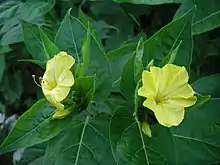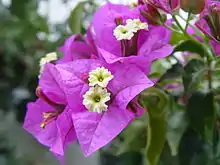| Nyctaginaceae | |
|---|---|
 | |
| Garden Four O'Clock (Mirabilis jalapa) flowers | |
| Scientific classification | |
| Kingdom: | Plantae |
| Clade: | Tracheophytes |
| Clade: | Angiosperms |
| Clade: | Eudicots |
| Order: | Caryophyllales |
| Family: | Nyctaginaceae Juss.[1] |
| Tribes | |
| |
| Synonyms | |
| |
Nyctaginaceae, the four o'clock family, is a family of around 33 genera and 290 species of flowering plants, widely distributed in tropical and subtropical regions, with a few representatives in temperate regions. The family has a distinctive fruit type called an accessory fruit or anthocarp, and many genera have extremely large (>100 µm) pollen grains.
The family has been almost universally recognized by plant taxonomists. The APG II system (2003; unchanged from the APG system of 1998), assigns it to the order Caryophyllales in the clade core eudicots.
A phylogenetic study by Levin has justified the combination of Selinocarpus and Ammocodon into the genus Acleisanthes. The genus Izabalea is now considered a synonym of Agonandra, a genus in Opiliaceae. A more recent study by Douglas and Manos clarified the relationships among almost all of the genera in the family and demonstrated that a substantial diversification of herbaceous genera has occurred in arid North America. Many genera of Nyctaginaceae possess unusual characters. Notable examples include sticky bands on the stems between the nodes, cleistogamous flowers (which self-pollinate without opening), or gypsophily, the ability to grow on soils with a high concentration of gypsum.
Genera
|
|
The extinct genus Mennegoxylon has been provisionally placed in the family.[10]
Note; as of February 2022, Plants of the World Online classes Boldoa as a synonym of Salpianthus and Grajalesia as a synonym of Pisonia.[11][12]
Uses
The family contains one food crop, the mauka (Mirabilis extensa), a root vegetable of minor local importance in the Andes. Garden Four-O'Clocks Mirabilis jalapa species are grown as ornamental plants, as are species of Bougainvillea (Bougainvillea glabra, B. spectabilis, and numerous hybrids), Bougainvillea and Abronia are commonly cultivated in warmer regions.
References
- ↑ Angiosperm Phylogeny Group (2009). "An update of the Angiosperm Phylogeny Group classification for the orders and families of flowering plants: APG III" (PDF). Botanical Journal of the Linnean Society. 161 (2): 105–121. doi:10.1111/j.1095-8339.2009.00996.x. Retrieved 2013-07-06.
- ↑ "Family: Nyctaginaceae Juss., nom. cons". Germplasm Resources Information Network. United States Department of Agriculture. 2003-01-17. Archived from the original on 2009-05-06. Retrieved 2010-10-18.
- ↑ "GRIN Genera of Nyctaginaceae tribe Boldoeae". Germplasm Resources Information Network. United States Department of Agriculture. Archived from the original on 2015-09-24. Retrieved 2010-10-18.
- ↑ "GRIN Genera of Nyctaginaceae tribe Bougainvilleeae". Germplasm Resources Information Network. United States Department of Agriculture. Archived from the original on 2015-09-24. Retrieved 2010-10-18.
- ↑ "GRIN Genera of Nyctaginaceae tribe Caribeeae". Germplasm Resources Information Network. United States Department of Agriculture. Archived from the original on 2015-09-24. Retrieved 2010-10-18.
- ↑ "GRIN Genera of Nyctaginaceae tribe Colignonieae". Germplasm Resources Information Network. United States Department of Agriculture. Archived from the original on 2015-09-24. Retrieved 2010-10-18.
- ↑ "GRIN Genera of Nyctaginaceae tribe Nyctagineae". Germplasm Resources Information Network. United States Department of Agriculture. Archived from the original on 2015-09-24. Retrieved 2010-10-18.
- ↑ "GRIN Genera of Nyctaginaceae tribe Leucastereae". Germplasm Resources Information Network. United States Department of Agriculture. Archived from the original on 2015-09-24. Retrieved 2010-10-18.
- ↑ "GRIN Genera of Nyctaginaceae tribe Pisonieae". Germplasm Resources Information Network. United States Department of Agriculture. Archived from the original on 2015-09-24. Retrieved 2010-10-18.
- ↑ Wheeler, Elisabeth; Manchester, Steven R. (January 2002). "Woods of the Middle Eocene Nut Beds Flora, Clarno Formation, Oregon, USA" (PDF). IAWA Journal. Nationaal Herbarium Nederland, The Netherlands: International Association of Wood Anatomists (3): 156. Retrieved 27 January 2021.
- ↑ "Boldoa Cav. ex Lag. | Plants of the World Online | Kew Science". Plants of the World Online. Retrieved 8 February 2022.
- ↑ "Grajalesia Miranda | Plants of the World Online | Kew Science". Plants of the World Online. Retrieved 8 February 2022.
- Levin, 2000, Phylogenetic relationships within Nyctaginaceae tribe Nyctagineae: Evidence from nuclear and chloroplast genomes. Systematic Botany 24(4) 738-750. (Subscription req.)
- Douglas, NA and Manos, PS. 2007. Molecular phylogeny of Nyctaginaceae: taxonomy, biogeography, and characters associated with a radiation of xerophytic genera in North America. American Journal of Botany 94(5) 856-872.
External links
- Nyctaginaceae in L. Watson and M. J. Dallwitz (1992 onwards), The families of flowering plants.
- Flora of North America: Nyctaginaceae
- NCBI Taxonomy Browser
- links at CSDL
- International Plant Names Index
